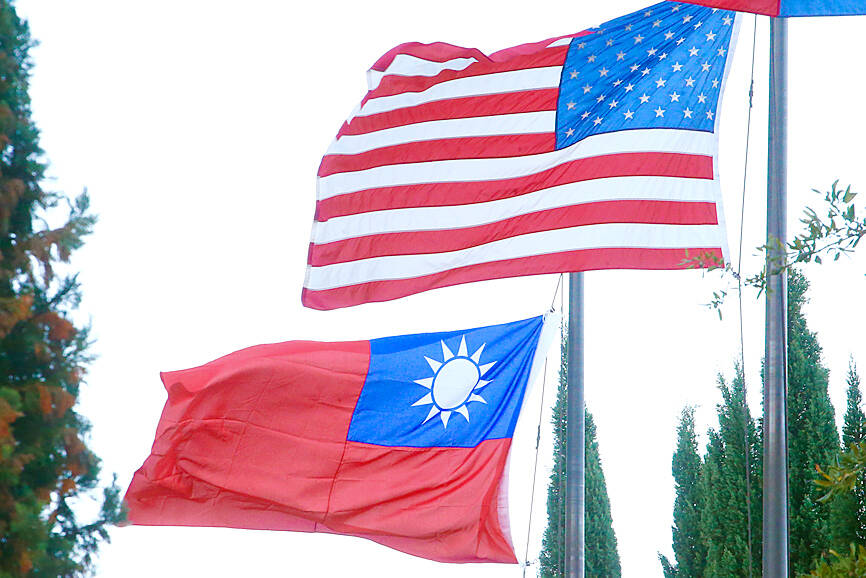The US government is appropriating funding to help Taiwan participate in its International Military Education & Training (IMET) program to enhance interoperability and capabilities for joint operations of the Taiwanse and US militaries.
The funding for Taiwan’s participation in the program is mentioned in the Consolidated Appropriations Act 2023, a US$1.7 trillion spending bill funding the US federal government for the fiscal year 2023. It covers funding for military support for Ukraine, defense spending and regions affected by natural disasters.
The American Institute in Taiwan (AIT) told the Chinese-language Liberty Times (the Taipei Times’ sister newspaper) that IMET is an important US security assistance initiative, which aims to bolster regional defense capabilities and maintain peace by offering professional training and education to military personnel around the world.

Photo: CNA
“IMET has been proven to be an effective means to strengthen the military and international alliances, which are crucial for the US to reach its national security goals,” the institute said.
“The program helps build professional and personal links at the level of defense leaders, who often play key roles during transitions in democratic countries,” it said.
“The program allows defense leaders to reach consensus on the common challenges facing the nations and form partnerships to cope with them,” the institute said.
The program — guided by the US Department of State’s Bureau of Political-Military Affairs and enforced by the US Department of Defense — has over the years been hosting outstanding military officers from Europe, Africa, Asia and Latin America to train with the US military, based on media coverage of the program.
While the act does not reveal details on how Taiwan would participate in the IMET program, diplomatic observers said that it might refer to the military training partnership between Taiwanese armed forces and the US National Guard.
US Senator Tammy Duckworth expressed a high level of interest in forming such a partnership during her two visits to Taiwan last year.
Taiwan’s All-Out Defense Mobilization Agency was reported to have a liaison officer in Washington as part of the Taiwan Military Advisory Group in the US to coordinate related affairs.

INVESTIGATION: The case is the latest instance of a DPP figure being implicated in an espionage network accused of allegedly leaking information to Chinese intelligence Democratic Progressive Party (DPP) member Ho Jen-chieh (何仁傑) was detained and held incommunicado yesterday on suspicion of spying for China during his tenure as assistant to then-minister of foreign affairs Joseph Wu (吳釗燮). The Taipei District Prosecutors’ Office said Ho was implicated during its investigation into alleged spying activities by former Presidential Office consultant Wu Shang-yu (吳尚雨). Prosecutors said there is reason to believe Ho breached the National Security Act (國家安全法) by leaking classified Ministry of Foreign Affairs information to Chinese intelligence. Following interrogation, prosecutors petitioned the Taipei District Court to detain Ho, citing concerns over potential collusion or tampering of evidence. The

‘FORM OF PROTEST’: The German Institute Taipei said it was ‘shocked’ to see Nazi symbolism used in connection with political aims as it condemned the incident Sung Chien-liang (宋建樑), who led efforts to recall Democratic Progressive Party (DPP) Legislator Lee Kun-cheng (李坤城), was released on bail of NT$80,000 yesterday amid an outcry over a Nazi armband he wore to questioning the night before. Sung arrived at the New Taipei City District Prosecutors’ Office for questioning in a recall petition forgery case on Tuesday night wearing a red armband bearing a swastika, carrying a copy of Adolf Hitler’s Mein Kampf and giving a Nazi salute. Sung left the building at 1:15am without the armband and apparently covering the book with a coat. This is a serious international scandal and Chinese

Seventy percent of middle and elementary schools now conduct English classes entirely in English, the Ministry of Education said, as it encourages schools nationwide to adopt this practice Minister of Education (MOE) Cheng Ying-yao (鄭英耀) is scheduled to present a report on the government’s bilingual education policy to the Legislative Yuan’s Education and Culture Committee today. The report would outline strategies aimed at expanding access to education, reducing regional disparities and improving talent cultivation. Implementation of bilingual education policies has varied across local governments, occasionally drawing public criticism. For example, some schools have required teachers of non-English subjects to pass English proficiency

TRADE: The premier pledged safeguards on ‘Made in Taiwan’ labeling, anti-dumping measures and stricter export controls to strengthen its position in trade talks Products labeled “made in Taiwan” must be genuinely made in Taiwan, Premier Cho Jung-tai (卓榮泰) said yesterday, vowing to enforce strict safeguards against “origin laundering” and initiate anti-dumping investigations to prevent China dumping its products in Taiwan. Cho made the remarks in a discussion session with representatives from industries in Kaohsiung. In response to the US government’s recent announcement of “reciprocal” tariffs on its trading partners, President William Lai (賴清德) and Cho last week began a series of consultations with industry leaders nationwide to gather feedback and address concerns. Taiwanese and US officials held a videoconference on Friday evening to discuss the